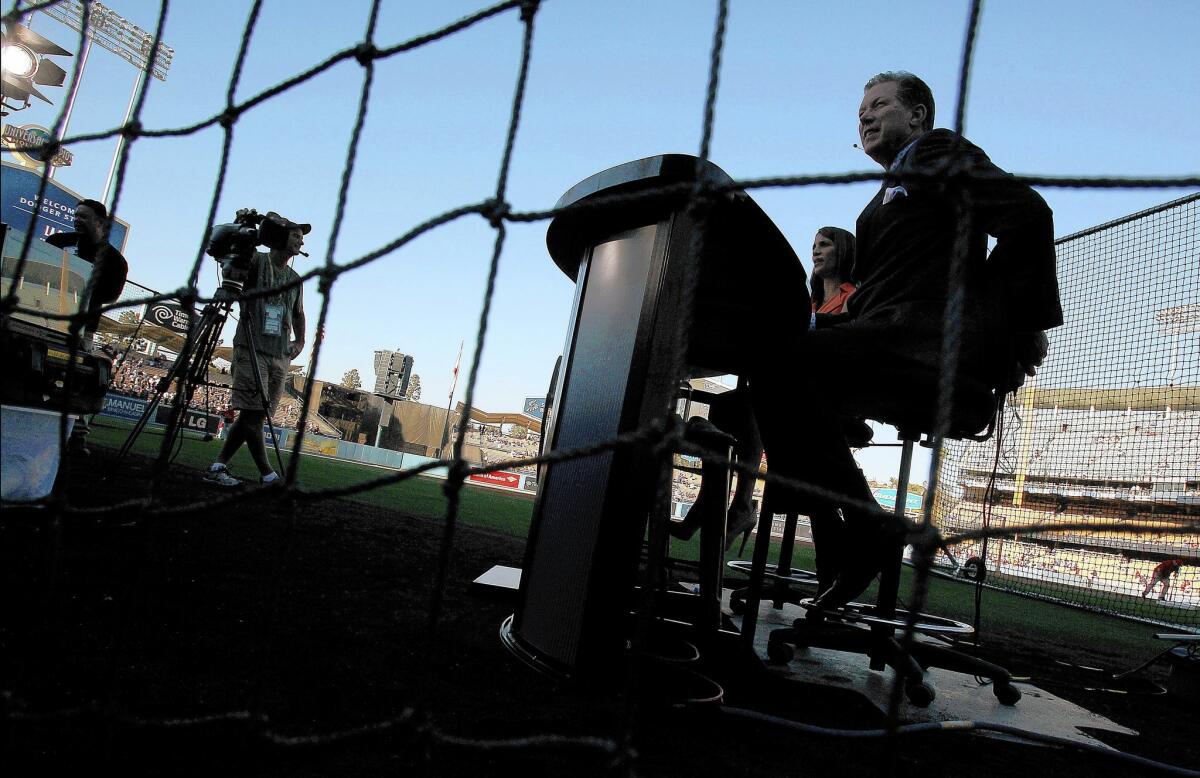Why isn’t your pay-TV bill reduced when a channel is removed?

- Share via
Los Angeles Mayor Eric Garcetti stepped up to the plate in the Great Dodgers Blackout this week, calling on federal regulators to look into why most people in the area can’t watch their favorite team on TV.
At issue is the ongoing spat over how much should be charged for SportsNet LA, the Dodgers channel exclusively distributed by Time Warner Cable. The company is seeking as much as $5 a month from all pay-TV subscribers, regardless of whether they’re sports fans.
It’s an important issue: Should people have to pay for something they don’t want? But there’s a flip side to the Dodgers debacle that also has pay-TV customers stewing.
Shouldn’t your bill be reduced when a channel goes away?
That question was posed to me by Maria Laduca, 61, after one of her favorite channels, Cloo, was dropped this month by Verizon’s FiOS service.
Cloo, owned by NBCUniversal, which is itself owned by cable giant Comcast, describes itself as offering “the best mystery and crime dramas.” That mostly means reruns of shows like “CSI,” “Monk” and “MacGyver.”
“I loved Cloo,” Laduca said. “I have insomnia, so I watched it all night.”
As of Aug. 18, however, the Long Beach resident’s nights became decidedly less criminal when Verizon yanked Cloo from the airwaves.
That was bad enough. But when her most recent bill arrived, Laduca realized that it was the same as always. She was still paying about $75 a month for FiOS, along with other sums for other Verizon services.
“That’s not right,” Laduca said. “If they take something away, you should pay less.”
Hard to disagree. If McDonald’s is selling a Happy Meal containing a burger, fries and a drink, and then it stops including the drink, there’s no economic rationale that would explain charging the same price. Other than greed, that is.
Cloo, formerly called Sleuth, has just a tiny fraction of the 2.6 million viewers claimed by ratings leader ESPN, which is estimated to account for about $6 of each pay-TV subscriber’s monthly bill. The monthly cost of Cloo could be as little as a few cents.
But that’s not the point. The point is, if you’re no longer receiving a product, you shouldn’t be paying for it. Laduca and other Verizon customers no longer receive Cloo, yet their bills remain unchanged.
What if it had been ESPN the company had axed? Would Verizon have kept each customer’s $6 a month for itself?
Jarryd Gonzales, a Verizon spokesman, said that “from time to time, we review the FiOS-TV channel lineup to make sure that all content is providing commensurate value to our customers, and occasionally that results in removal of particular channels.”
He said removing a little-watched channel “often helps us to forestall price increases.” But people’s bills might not go down, Gonzales said, because Verizon continues “to add more content and features to our FiOS customers.”
He noted that FiOS has beefed up its mobile offerings with its online app and has added more high-definition channels, including Al Jazeera America and conservative One America News Network.
The counter to that, of course, is that not all customers may want to watch TV on their mobile devices or view the new HD channels. But they’re paying for them regardless.
Keeping bills high even when a service is discontinued seems like business as usual for the pay-TV industry. Last month, Comcast shut down the horror channel FEARnet in favor of its scare-centric channel Chiller.
Subscribers of AT&T’s U-verse TV service were among those losing FEARnet. A company spokeswoman, Georgia Taylor, acknowledged that nobody’s U-verse bill went down as a result of the channel disappearing.
I asked why.
“Because we are adding content continuously,” Taylor answered.
She declined to name any content added since FEARnet’s demise.
I never watched Cloo or FEARnet, so I can’t say whether their absence is a meaningful loss. But I know this: If a company takes away something, you shouldn’t be paying the same price. And it’s not an acceptable alternative to make up the difference with something else that I didn’t ask for.
As for the Dodgers channel, roughly two-thirds of TV viewers in the L.A. area have been unable to watch games because of the bickering over SportsNet LA.
“The Dodgers are a key part of the fabric of this city, and Dodgers games with the legendary Vin Scully in the broadcast booth have traditionally been available to viewers throughout this region at no extra charge,” Garcetti wrote in his letter to the Federal Communications Commission. “That is not true this year.”
He asked the agency to look into the matter and “determine why the problem has not been resolved already.”
The answer seems so obvious. Everyone’s pay-TV bill should start at zero. Your bill would rise as you add channels to your desired programming lineup.
Maybe some channels, such as Cloo, would find it hard to win viewers in such a highly competitive landscape. Maybe others, including ESPN, would have to undergo significant restructuring to be offered at prices consumers would be willing to pay.
As conservatives are fond of saying, this is how a free market is supposed to work.
And if existing content providers are unable to adapt to such a world, I have no doubt that more nimble players would emerge who can win people’s business.
As Cloo viewers know from watching old “MacGyver” episodes, there’s always a solution to every problem. And it’s usually not as complicated as people might think.
David Lazarus’ column runs Tuesdays and Fridays. He also can be seen daily on KTLA-TV Channel 5 and followed on Twitter @Davidlaz. Send your tips or feedback to david.lazarus@latimes.com.
More to Read
Inside the business of entertainment
The Wide Shot brings you news, analysis and insights on everything from streaming wars to production — and what it all means for the future.
You may occasionally receive promotional content from the Los Angeles Times.











